On Hurricane Milton, or How, for Me, the World Finally Ended
Chaos, Simulacra, and the End Already Here
Shanghai, Typhoon Bebinca, Strongest Typhoon the city has seen in almost a century…
And after it was all over, I ventured out: there to marvel at the destruction. Hurricanes, slaves to the cosmic gods, are endowed with power over time as well as space; they are vortices of expedited atrophy, a disgorgement of unruly disorder, decaying all, demolishing all, returning all things to their elements.
I poked around.
Ages seemed to have passed. Eons had dissolved into a single day. Fish, with meditative delight, now swam in the car park. Trees, shredded like chicken, had spread their vegetation to all corners of the earth, making green where there had only ever been grey. Walls no more. Boundaries broken. Water everywhere. Chaos had come again.
And there, amidst all this devastation, was I, the last and first of men. Only survivor. Alone to the world and ready to begin again. Then the cleaners and handymen appeared to begin their toil, and I retreated inside, abashed as to the stupid and squalid nature of my dreams…
Over the next few days, I reflected on my experience of the hurricane. I tried out this strange and sudden obsession with the apocalyptic. Ultimately, I settled on the fact that there had been a neolithic primacy to the entire thing—a primal immediacy: for one whole day I had been an ape hanging in a windswept tree…
My work —all work—had been annulled, granting me the rare chance to stay home with my family. Powerless against nature, and equally without power when faced with my loved ones, I was thrust back into the real—that raw and forgotten interplay of human interaction. How I missed you! And who knew my son was such a talented artist?
In the kitchen, alone with my thoughts, the lights chittering on and off, I clutched my supplies of fresh water and rice, expatiating to my-more-civilized-self on the need for violence if worst came to worst.
In other words, I had become human again…
Eventually, this bizarre re-realizing of the homo, manifested itself as an obsession with storms, their formation, their fury, etc.… Inanely put: There was a tempest in me…
Flotsam facts in the wake of a hurricane:
· Only in the Atlantic and the northeastern Pacific are they known as Hurricanes, their name derived from Huracán, a storm god of the Caribbean Taíno people.
· In the northwestern Pacific, they are referred to as typhoons, a word likely deriving from the Chinese word taifeng (台风), meaning "great wind," or from the Greek word typhōn, meaning "violent storm" or "whirlwind."
· In the South Pacific and Indian Ocean, they are fantastically known as cyclones. This comes from the Greek word kyklon, meaning "circle" or "wheel," referring to the circular nature of the storm’s winds.
· A fully developed hurricane can release as much energy as 10 atomic bombs per second!
· The most intense and dangerous part of a hurricane is called the "eye wall," which surrounds the eye. This area has the strongest winds and the heaviest rain.
Thus, I came to look at the sky winsomely. I watched the meteorological maps with a desperate hope; I demanded category 5, if nothing else, explaining to my son at the occurrence of such a catastrophe of the need to cower in the kitchen rather than watch the elements contend out our bedroom window. Overcome with cyclonophilia, I desired a true dissolution of the essentials, then, I really believed, I would be I.
A few weeks later, unfortunately, I got my wish, though only vicariously…
From the images pouring out of Florida and other parts of the southeast, we can see a devastation so thorough, so breathtakingly monumental in its scope, so Pavlovian in its sense as to make all men cry at the word “hurricane”, that we may utter what we very rarely get a chance to, that the sordid empire of man is less this day.
Consequently, for me both hurricane Milton and Helene became a fantasy in which to indulge my primal and immoral instincts. With the help of the internet, I was able to interface with both these terrors at all times. A hypertext I could not stop clicking on. By satellite I watched their approach. By live feed I marveled at the inundation of several cities. By X and other platforms, including substack, I was able to hear the cries of the lost. By every news outlet I had facts squawked at me by talking heads. I tried to be as on the ground as I could without actually being there…
Obviously, this was stupid. I was unable to recapture the thrill of Bebinca. Worse. I merely slipped into a delusion.
In this search for myself, I became less myself, more a dumping ground for Pepsi commercials, political attack ads, pop-ups, nonsense, dreams and debilitations. The only hurricane I really experienced was that of a faux world, a feverous swirling of the inane, with me in the center, a brief node of clarity, eventually overcome by despair.
It was ridiculous.
The juxtaposition crazed.
People’s lives were being destroyed, their homes obliterated and yet YOU WON’T BELIEVE THE ONE AND ONLY FROSTY IS A BUCK. Because… it’s just Gotta Be Wendy’s… Fuck those people.
The floodwaters rose, swallowing entire neighborhoods, and yet Get 30% off on our exclusive range of noise-cancelling headphones. Because… why not just tune out the chaos?
Harris Campaign Looks To Avoid Mistakes of 2016 Clinton Campaign: the polls are tied, by the way, if these minor weather-related- phenomena haven’t distracted you.
A slight headache in toe, I went back to work. I had slipped. My hopes had returned to me as farce. I had gotten lost, wandered into mazeland on mirror world. The hurricanes had become mere events, realities unto themselves, a chance to sell insurance and do some point scoring. They became, what Baudrillard called, hyperreal.
It happens in four stages.
First: The Reflection of Basic Reality
The image is a faithful copy of the original; it reflects a profound reality.
The image mirrors reality —a straightforward representation, it is a true reflection of something tangible. A portrait for instance that captures not just the likeness but the essence of its subject. Here, the symbol aligns almost exactly with the substance; the map, as Baudrillard would say, corresponds accurately to the territory.
Second: The Masking and Perversion of Reality
The image masks and distorts the reality; it is a corrupted version of the original.
We proceed, but the image begins to twist the truth, masking and warping the reality it once loyally depicted. Think advertising and its disgusting glossy veneer: the hamburger on the billboard, succulent, towering, far removed from the flattened sandwich of cow entrails served at the counter. The image seduces now. It presents an idealized version that perverts the authentic. It's a funhouse mirror. It exaggerates features. It misleads the eye. Reality is still there, but it's obscured—veiled behind a facade of allure and manipulation.
Third: The Masking of the Absence of Reality
The image pretends to be a faithful copy, but there is no original; it masks the absence of reality.
We go deeper still, and the image becomes a masquerade with nothing behind the mask. It suggests substance where none exists. Think Disneyland, the gaudy and lively anthropomorphic creatures, the quaint cottages, and model castles, these hint at a past that never was. The image here doesn't distort reality; it replaces it with a false echo, concealing the void beneath. It misleads the mind.
Fourth: Pure Simulacrum—The Image with No Relation to Reality
The image has no relation to any reality whatsoever; it becomes its own pure simulacrum.
Finally, we plunge into the abyss, lost, hopeless, where the image stands alone, untethered from any origin or truth. This is the realm of the hyperreal, where simulations generate their own reality. Think virtual worlds in online games—vast landscapes, societies, economies—all constructed without a counterpart in the tangible. Or worse: a social media persona curated to masturbation levels, bearing little resemblance to the individual's lived experience. Here, the simulation is not a copy but an entirely new creation. The boundaries between the real and the imagined blur. Eventually they dissolve. The map precedes the territory, and then engulfs it entirely. It destroys the soul.
Such was I, then, caught in this lowest level of virtual hell. But the question, for me, became why? Why do we construct these hyperrealities?
The easy answer would be because we cannot bear our present reality, our (strange enough to say) real reality. We are fragile souls. The world we inhabit demands perfection, utopia. But we are flawed beings, crazed and lost, bald chimps with the aspiration of angels.
But something about this hurricane was different.
Hurricanes, at their time of striking, should be supremely apolitical phenomenon. All efforts should solely be made to help those affected. Milton, however, was quickly recontextualized by both sides of the political spectrum to serve their respective realities.
For the Republicans it was merely another symbol of American decline under the Democrats, a forceful and piquant reminder of the way they believe the country has been trashed over the last four years.
For the Democrats Milton was merely an extension of the bluster of Trump. They could not think of the thing without somehow dragging him into it. For all the hot air of a tropical vortex, it was merely a hairdryer compared with their sun-sprayed nemesis.
All in all, it was a political magic land, replete with garish ads, idiotic and phony news personalities, and gushing media mouthpieces. Poor Milton didn’t stand a chance.
I’m surprised the Meteorologists with an ironic and postmodern comedic twist didn’t simply name the two hurricanes Harris and Trump, thus saving me an eternity of explanation.
Another point of interest: they kept calling each other liars and frauds. There was talk of Ukraine, FEMA, Lebanon, Israel, inflation, etc. etc. etc. as if somehow every global crisis were tied into these hurricanes.
But here’s the thing: they weren’t lying, not by hyperrealistic standards. They were simply operating in their own respective realities, realities in which their stories were entirely plausible, if not inevitable. The hurricane, instead of an objective disaster, was only a mirror reflecting the truths of a divided reality. In this sense, there were no liars, only inhabitants of their own separate, constructed universes, each convinced of the authenticity of their hyperreal interpretations.
In the end, the storm wasn’t the true catastrophe—it was only a highlight to the loss of a shared reality.
Of course, this all had absolutely nothing to do what life was like on the ground. This political map preceded the territory of the lost and miserable souls who wandered in the new vacancy of their lives—subsuming it, making us all forget that hungry, shivering, and sodden world.
I thought to leave it at that – to forget – to turn from the hyperreal glitz and glare and return to the cold piss of the present.
But then another rumor appeared, caught my eye, spread across the internet like a virus, made me dizzy. Far more sinister and interesting in its dimensions, it seemed to return me to where I had begun my journey…
The Apocalyptic Instinct: Disparate Thoughts from A Deranged and Despairing Mind
“Yes they can control the weather,” wrote Congresswoman Marjorie Taylor Greene on X.
The belief that man can now control the weather and that he would turn it upon his own people, ravage his own nation, all for the measly chance to rule a breaking world… what else could this be but the end is near, the end has come, doomsday is upon us… To think it is to believe it.
The apocalyptic instinct is not a new phenomenon. It must be remembered that Jesus came to end the world.
There is a seed of chaos implanted into every human soul, that they might tear the world down and remake it in their image.
Nature herself has grown craven and is tearing herself down.
This isn’t political; rather anti-political, neither left nor right. The physical disintegration was not enough, but there is also a want for both political and social disintegration.
But perhaps:
This strange new apocalyptic instinct could be seen as a response to the overwhelming confusion that hyperreality has caused. In a world where truth is murky, utterly distorted, or outright manufactured by the media, people are now longing for an apocalyptic event that will finally clarify everything. In a surreal sense, an apocalyptic event promises an end to the disorienting complexity of hyperreality. It is a rebellion against the world. It is an appeal to a final, absolute truth, where all is revealed, even if through catastrophe. The apocalypse provides an (if only imagined) moment of clarity amidst the perpetual confusion of simulated realities.
Or:
Hyperreality often detaches individuals from the real world, offering a retreat into virtual. The apocalyptic instinct feeds on this by providing an ultimate escape—an ending to the hyperreal itself. The apocalypse promises a fresh start, a purging of the false, simulated world in favor of something more authentic, even if that authenticity comes through the utter destruction of all. In this way, the apocalyptic instinct aligns with the desire to escape the hyperreality, its artificiality, its disgust.
I have often found myself hating myself.
It is to return to something primal, uncontrollable, and real—though paradoxically, it is still rooted in a fantasy generated by the hyperreal system.
A Conclusion of Sorts
In the end, my obsession with Milton was no different from Bebinca—both were storms that carried me to the edge of reality, only for the hyperreal to swallow it whole again. Sadly and sickly for myself and the sadness I now feel: the chaos I longed for was never about the hurricanes but about the hope for something real in a world that has forgotten how to recognize it… A tiny seed of its chaos has embedded itself within my heart and I begged it to bloom…
But it will not because there is something un-understood and ignored in all this: it is not wrong to want the end, because the end has already come, we are just too busy living in hyperreality to realize it.




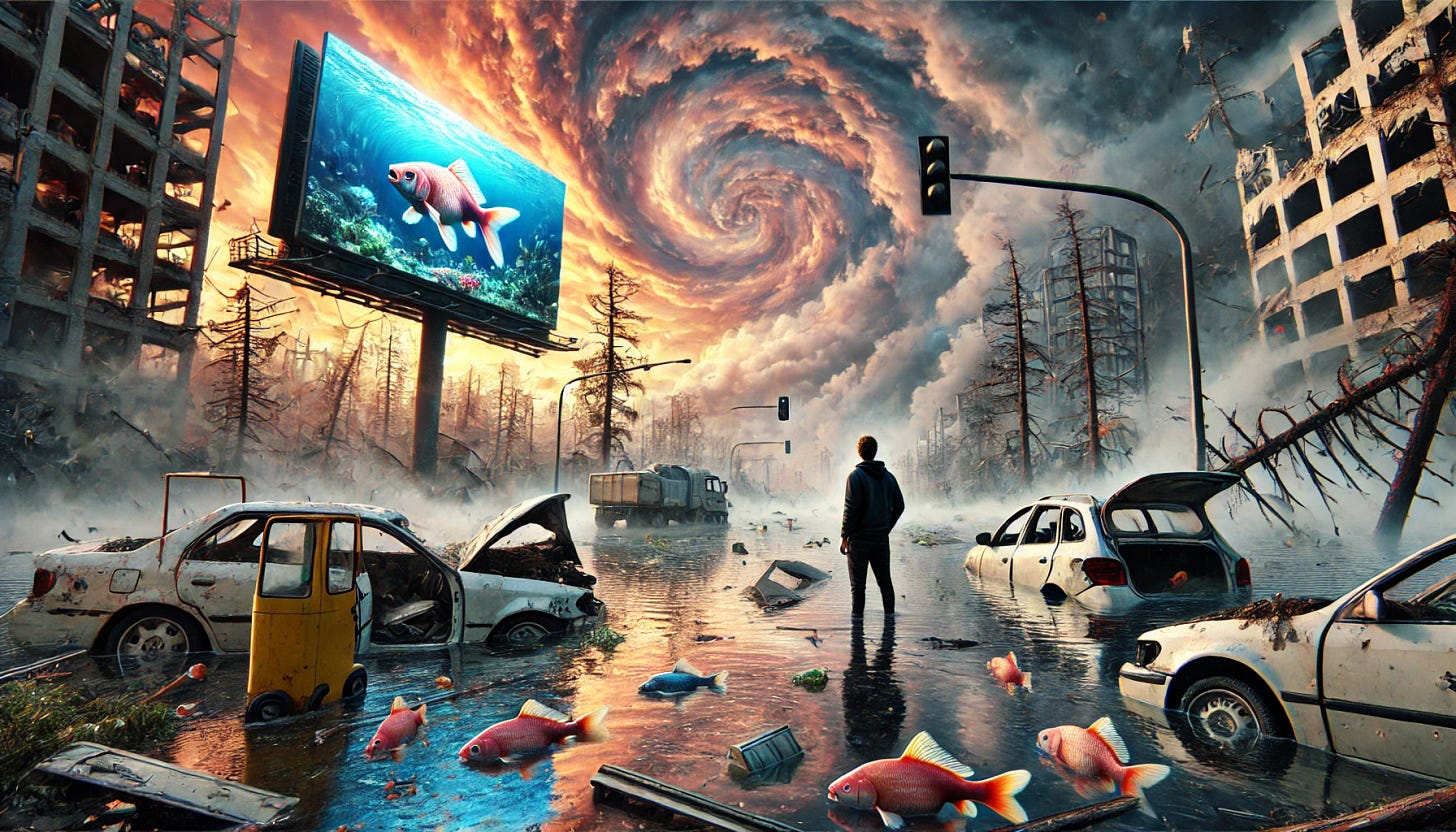
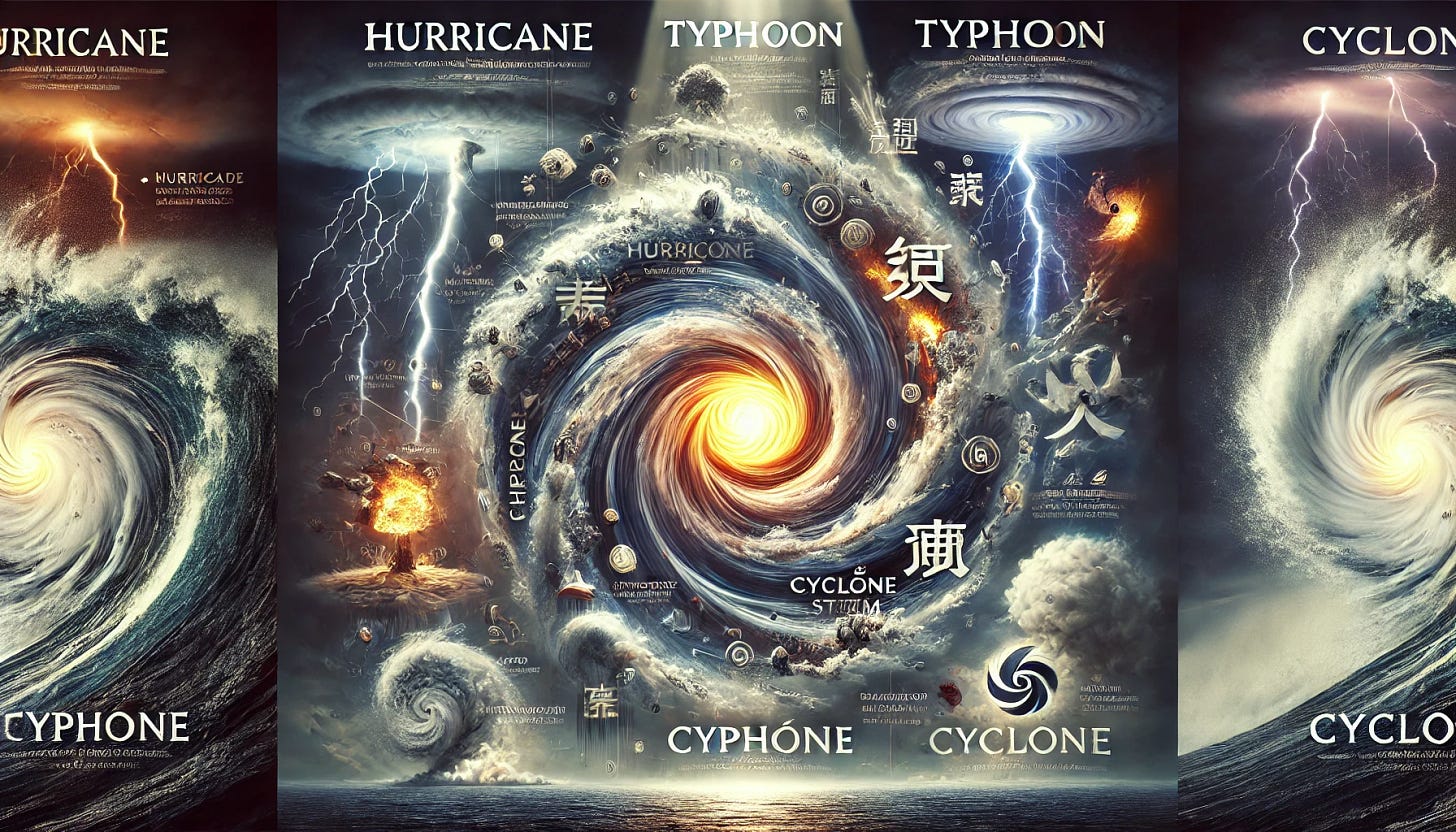
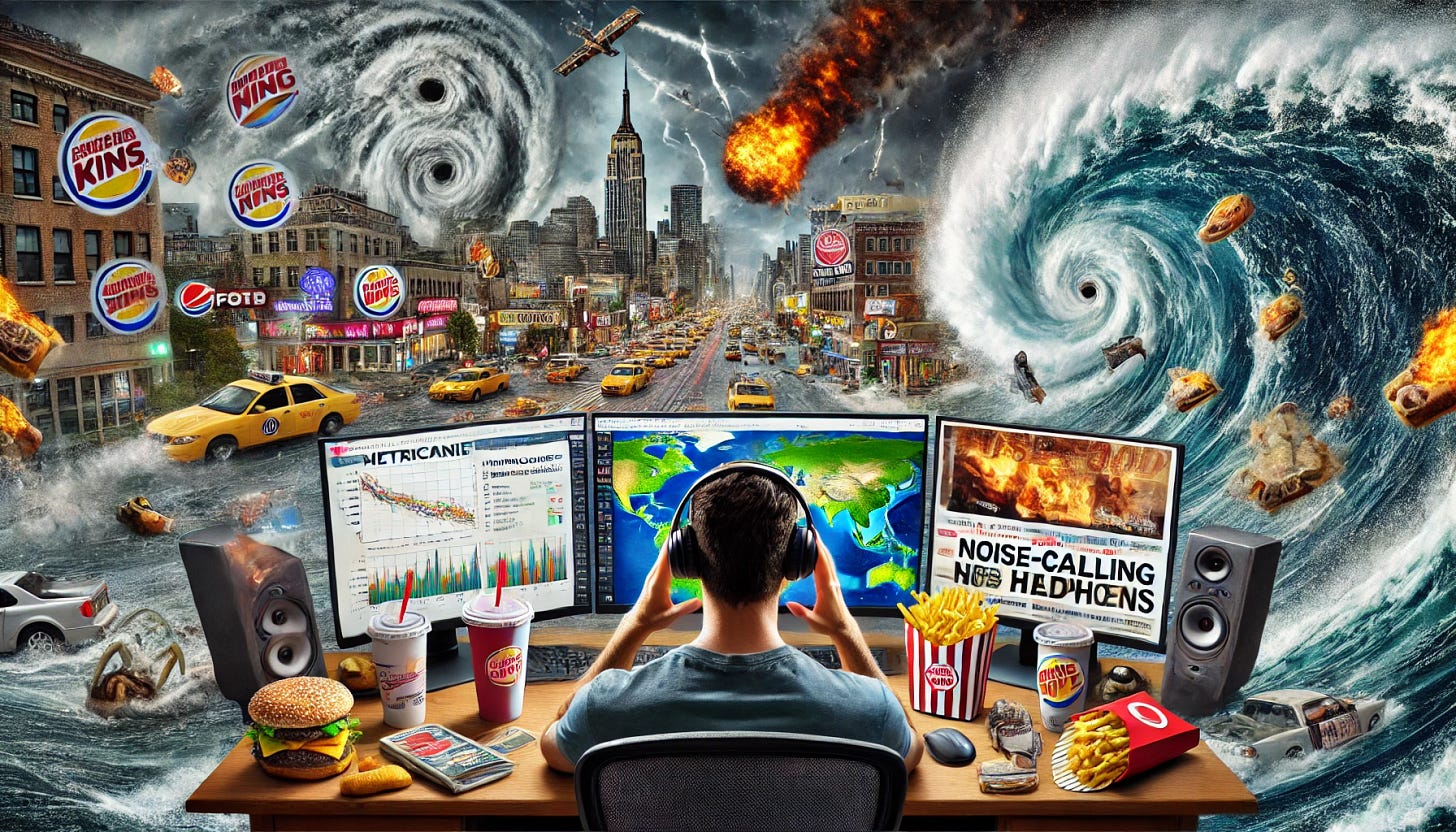
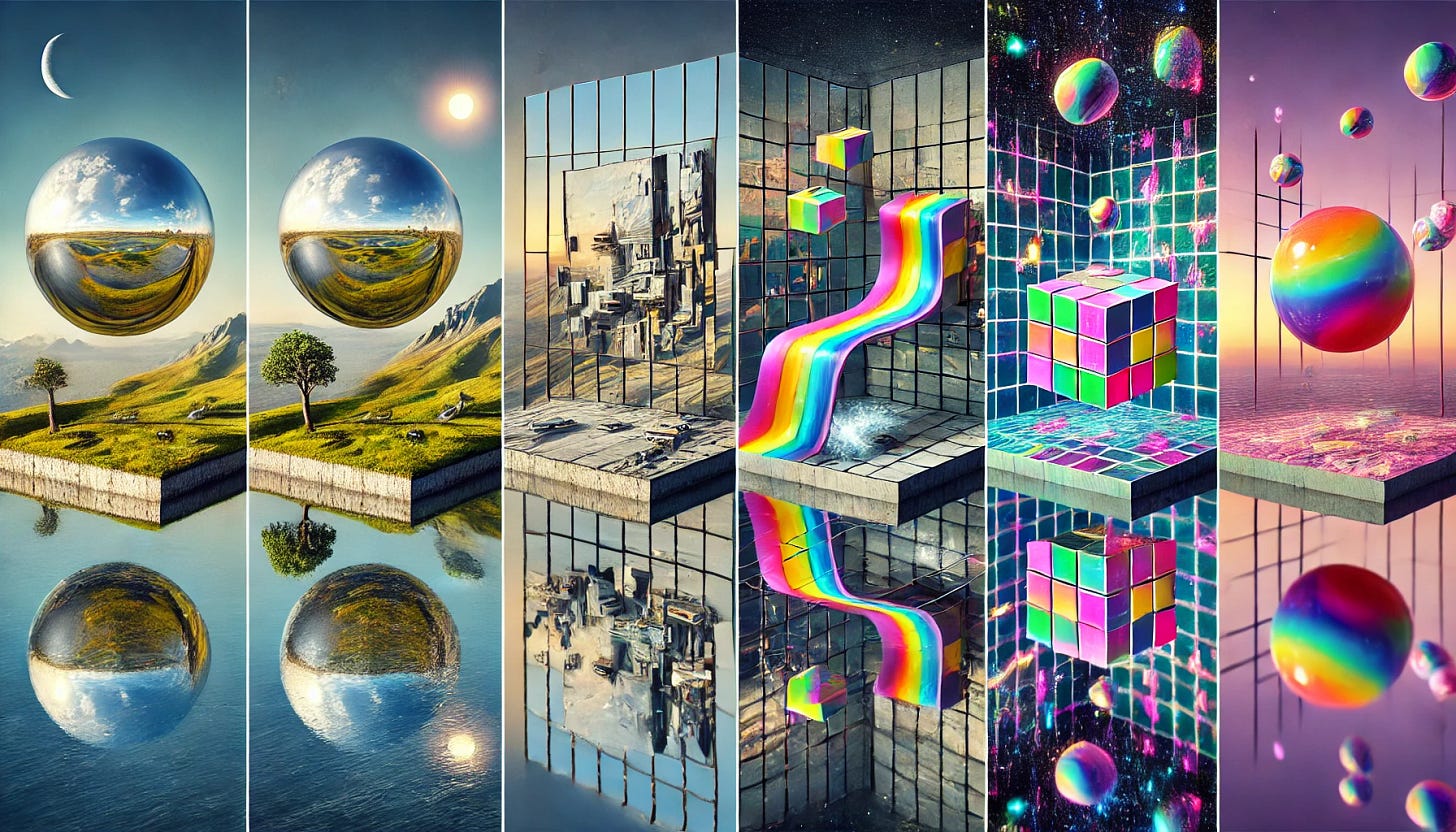
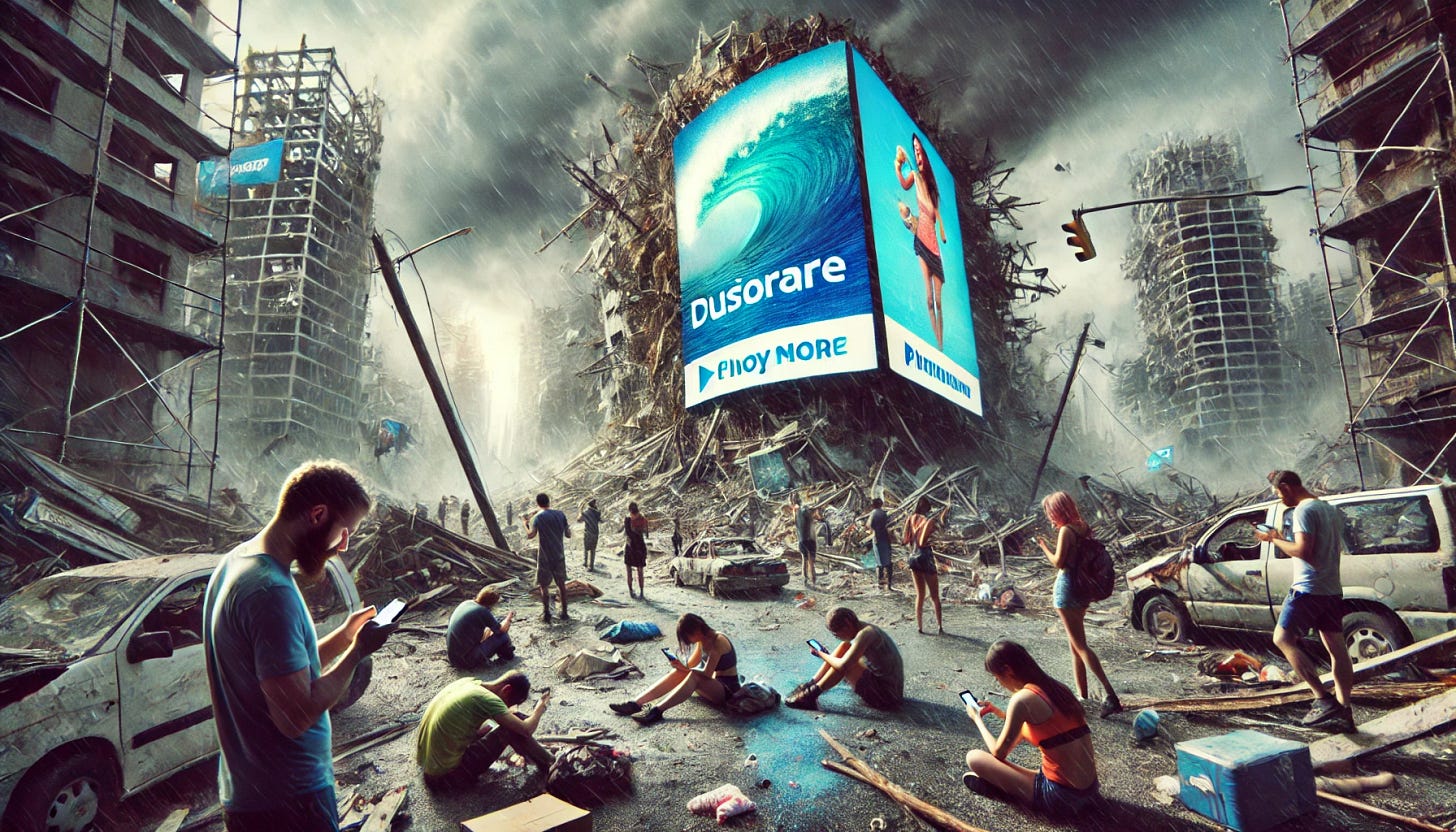


saying x is in control is just a way of avoiding responsibility for one's negativity, a narcissistic way to blame X without taking the blame, but get the credit for informing the boss, the one who can hurt you, and hopefully them because you have sucked up to them, demagogues surf this meanness among us with ease. It is resident among us even without ressentiment and lost entitlement.
I loved this read brother. Nature is such a powerful force yet we think we can simply close the door on it.
Thanks for writing it.